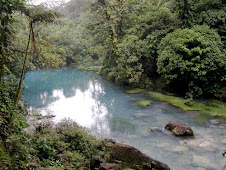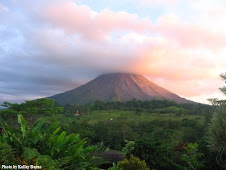El estilo pachuco, the way Costa Ricans describe a very "ordinario" way of speaking, has a different way to say just about anything. If you ever meet a hopeless pachuco, someone who makes a point of using the slang version of EVERYTHING, he might even give you a different variation of Costa Rica's signature 'pura vida'. "Rapu davi, jema," he might say to you. Please note that this utterance is simply the juxtaposition of syllables in the words 'pura vida, maje'. (Note that 'maje' is now popularly pronounced and spelled 'mae' and is often used in the same way and with the same frequency as 'dude' in English.)
Rapu davi, goami. :::wink:::
By the way, I just Googled 'rapu davi' and one of the top web results was a page about Chile's Easter Island, or 'Rapa Nui' in the local tongue. (That is, Easter Island's natives' language, not Spanish.) I don't really care to research that one much more, but every time I had previously thought of 'rapu davi', Easter Island had come to mind. Maybe I'm not the only one...
Friday, February 29, 2008
Holy Smokes!!!
In Costa Rica, you might hear an old woman exclaim "diantres!" I used to always wonder why one of my neighbors would always say that when she was shocked by something. Good ol' Mailí, an Evangelical Christian, eventually explained to me that it is an acceptable way to avoid saying 'diablos', which means 'devils'. It seems that it's not only English that has those loopholes for saying quite nearly what you mean, but without the negative stigma of actually doing it.
Interesante, ¿es o no es?
Pura Vida,
;)
Interesante, ¿es o no es?
Pura Vida,
;)
Tuesday, February 26, 2008
You'll Enjoy this Post (God Willing)
The use of 'God' in Costa Rican Spanish can be quite perplexing to the lay observer. Costa Ricans, whether particularly religious or not, will invoke 'Dios' for all sorts of circumstances. Below are a few of the most common expressions that use the lord's name:
Gracias a Dios - Meaning 'thanks to God', this expression follows the telling of good news. "My son got into the University of his choice, gracias a Dios", a Costa Rican might say. "I'm doing great today, gracias a Dios". You get the point.
Si Dios quiere - Costa Ricans can hardly ever make any sort of future projection without putting 'God willing' before or after it. Even things that seem largely within the control of the speaker are accompanied by 'si Dios quiere'. This expression often causes confusion between Costa Ricans and foreigners. Gringos often wonder, "will this person actually attend the 4 o'clock meeting, or will he just pray for it to be so?" Very often, ONLY GOD KNOWS!!! ***For an entertaining little parody that exemplifies this cultural phenomenon, although in an exaggerated manner, visit http://www.ruralcostarica.com/si-dios-quiere.asp.
There are several more references to God that I'll touch on in the next post.
Dios me los bendiga ;)
Gracias a Dios - Meaning 'thanks to God', this expression follows the telling of good news. "My son got into the University of his choice, gracias a Dios", a Costa Rican might say. "I'm doing great today, gracias a Dios". You get the point.
Si Dios quiere - Costa Ricans can hardly ever make any sort of future projection without putting 'God willing' before or after it. Even things that seem largely within the control of the speaker are accompanied by 'si Dios quiere'. This expression often causes confusion between Costa Ricans and foreigners. Gringos often wonder, "will this person actually attend the 4 o'clock meeting, or will he just pray for it to be so?" Very often, ONLY GOD KNOWS!!! ***For an entertaining little parody that exemplifies this cultural phenomenon, although in an exaggerated manner, visit http://www.ruralcostarica.com/si-dios-quiere.asp.
There are several more references to God that I'll touch on in the next post.
Dios me los bendiga ;)
Futbol vs. Fútbol
Soccer in Costa Rica is pronounced futbol, with the accent over the last syllable. This is different from the standard Spanish fútbol that people say in other parts of the Spanish-speaking world. Interestingly enough, though, Costa Ricans will still spell soccer with the standard 'fútbol' orthography.
Ir v. Irse
In Costa Rica use irse only when someone is going away for good. Anything that is only temporary only warrants the verb ir. So, if you're going to the United States to visit your family, say "Voy a los Estados Unidos". Don't say "Me voy para los Estados Unidos", unless you really are moving back to the United States. I used this last sentence once, which prompted a number of mushy text messages to my cell phone. After realizing what had happened, I had to notify people that I would be back within a few weeks.
Pura Vida,
;)
Pura Vida,
;)
Subscribe to:
Posts (Atom)


